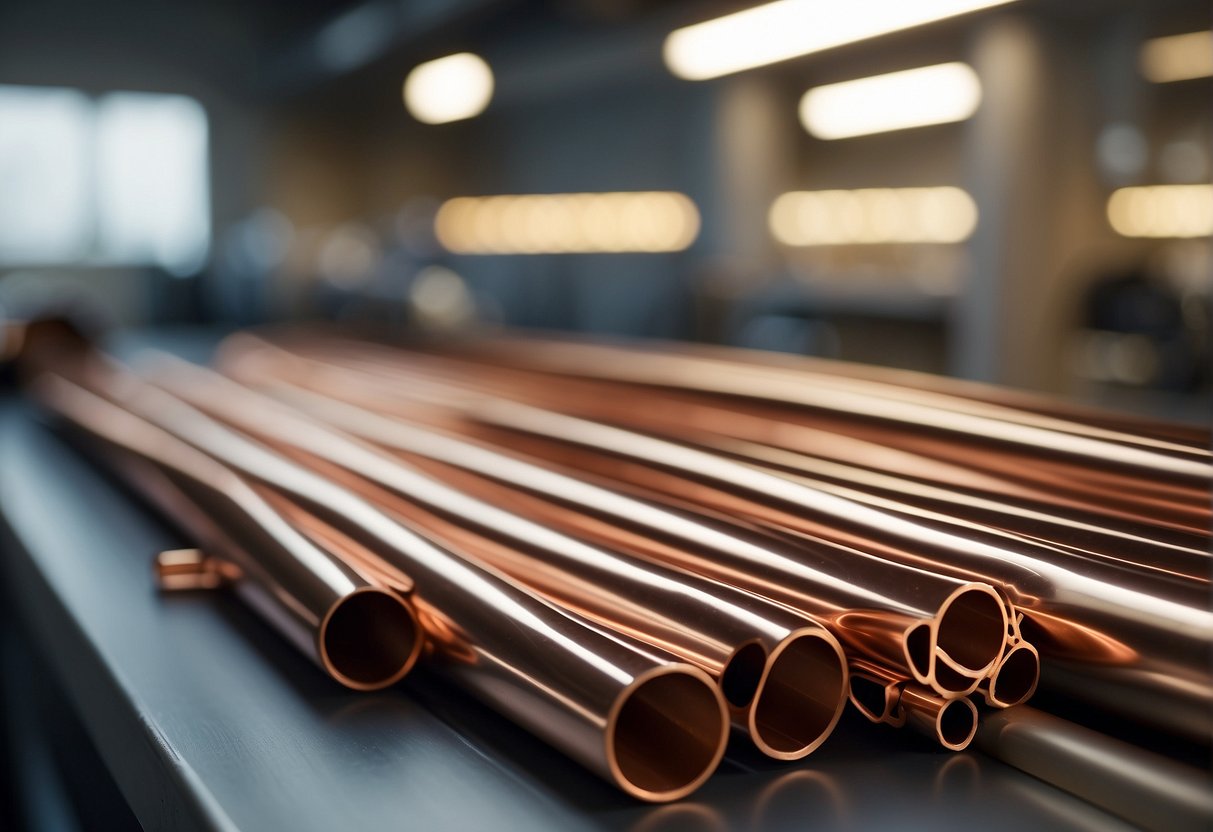Copper pipes and PVC pipes are two of the most common types of pipes used in plumbing systems today. Both materials have their advantages and disadvantages, and choosing between them can be a difficult decision. In this article, I will explore the differences between copper pipes and PVC pipes, and provide you with the information you need to make an informed decision when it comes to your plumbing needs.
Material Properties and Applications
Copper pipes are known for their durability and longevity. They are resistant to corrosion and can last for decades with proper installation and maintenance. Copper is also a good conductor of heat, making it an ideal material for hot water pipes. PVC pipes, on the other hand, are lightweight and easy to install. They are also resistant to corrosion and can be used for a variety of applications, including water supply and drainage systems. However, PVC pipes are not suitable for high-temperature applications and may become brittle over time.
Installation and Maintenance
Installing copper pipes requires specialized tools and skills, as each joint must be soldered to ensure a watertight seal. This can make copper pipes more expensive to install than PVC pipes. PVC pipes, on the other hand, can be installed using simple tools and techniques, making them a more affordable option. When it comes to maintenance, copper pipes require less maintenance than PVC pipes, but may need to be replaced if they become corroded or damaged. PVC pipes, on the other hand, are easy to repair or replace when necessary.
Cost and Budget Considerations
Copper pipes are generally more expensive than PVC pipes, but they also last longer and require less maintenance. PVC pipes are a more affordable option, but may need to be replaced more frequently. When choosing between copper pipes and PVC pipes, it is important to consider both the upfront cost and the long-term cost of each material.
Key Takeaways
- Copper pipes are durable and long-lasting, while PVC pipes are lightweight and easy to install.
- Installing copper pipes can be more expensive than installing PVC pipes, but copper pipes require less maintenance over time.
- When choosing between copper pipes and PVC pipes, it is important to consider both the upfront cost and the long-term cost of each material.
Material Properties and Applications
Composition and Durability
Copper pipes are made of copper, a naturally occurring metal that is highly durable and resistant to corrosion. Copper pipes are known for their long lifespan, as they can last for up to 50 years or more with proper installation and maintenance. PVC pipes, on the other hand, are made of plastic and are not as durable as copper pipes. PVC pipes can become brittle over time, especially when exposed to cold temperatures, which can cause them to crack and leak.
Temperature and Pressure Tolerance
Copper pipes are suitable for both hot and cold water applications, as they can withstand high temperatures and pressure. PVC pipes, on the other hand, are not recommended for hot water applications, as they can warp and melt when exposed to high temperatures. PVC pipes are best suited for cold water applications, such as drainage and irrigation systems.
Suitability for Different Plumbing Applications
Copper pipes are commonly used for potable water supply lines, as they are resistant to corrosion and can withstand high temperatures and pressure. Copper pipes are also used for gas lines, as they are highly durable and can withstand the high pressure associated with gas distribution. PVC pipes, on the other hand, are commonly used for drainage and irrigation systems, as they are lightweight and easy to install.
In summary, copper pipes are highly durable and suitable for both hot and cold water applications, making them a popular choice for potable water supply lines and gas distribution systems. PVC pipes, on the other hand, are best suited for cold water applications, such as drainage and irrigation systems, due to their lightweight and easy-to-install nature.
Installation and Maintenance
Ease of Installation
When it comes to installation, PVC pipes are generally easier to install than copper pipes. PVC pipes are lightweight and easy to cut and connect using glue or compression fittings. On the other hand, copper pipes require soldering, which involves heating the pipes and using a metal alloy to join them. Soldering requires specialized tools and skills, and can be difficult for DIY enthusiasts who are not familiar with the process. Therefore, if you are planning to install new pipes yourself, PVC pipes might be a better option for you.
However, if you prefer to hire a professional plumber to install your pipes, then the ease of installation might not be a significant factor. Professional plumbers are trained and experienced in installing both copper and PVC pipes, and can complete the job quickly and efficiently regardless of the material used.
Repair and Maintenance Requirements
When it comes to repair and maintenance, copper pipes have the advantage over PVC pipes. Copper pipes are more durable and can last up to 70 years, while PVC pipes have a lifespan of around 25 years. Copper pipes are also more resistant to leaks and corrosion than PVC pipes, which can become brittle and crack over time. In addition, copper pipes can withstand high temperatures and pressures, which makes them suitable for hot water systems.
However, if a leak does occur in a PVC pipe, it is usually easier to repair than a leak in a copper pipe. PVC pipes can be cut and replaced easily, and do not require soldering. Copper pipes, on the other hand, require soldering to repair a leak, which can be time-consuming and costly.
In terms of maintenance, both copper and PVC pipes require regular maintenance to ensure optimal performance. Copper pipes should be checked for signs of corrosion and leaks, while PVC pipes should be inspected for cracks and damage. It is recommended to hire a professional plumber to perform regular maintenance on your pipes, as they can identify and fix issues before they become major problems.
Overall, when it comes to installation and maintenance, both copper and PVC pipes have their advantages and disadvantages. It is important to consider your specific needs and preferences when choosing the best material for your plumbing system.
Cost and Budget Considerations
When deciding between copper pipes and PVC pipes for residential plumbing, cost and budget are important considerations. In this section, I will discuss the initial costs and long-term savings of each material and provide tips for calculating costs for residential plumbing.
Initial Costs and Long-Term Savings
PVC pipes are generally more affordable than copper pipes, with plastic pipes costing only $.50-$5 per linear foot compared to copper plumbing, which can cost $20-$30 per linear foot. However, it is important to consider the long-term savings of each material. Copper pipes have a longer lifespan than PVC pipes, meaning that they may end up saving you money in the long run. PVC pipes may require more maintenance and replacement over time, which can add up in costs.
Another factor to consider is the cost of installation. Copper pipes are more difficult to install than PVC pipes, which can add to the installation cost. However, copper pipes can fit into more compact spaces than PVC pipes can, which may be a factor in some residential plumbing projects.
Calculating Costs for Residential Plumbing
When calculating costs for residential plumbing, it is important to consider both the initial costs and the long-term savings of each material. One way to do this is to calculate the total cost of each material, including installation and maintenance costs, over the lifespan of the pipes. This can help you determine which material is more cost-effective for your specific project.
Another way to calculate costs is to consider the specific needs of your project. For example, if you are working on a low-cost residential plumbing project, PVC pipes may be the more affordable option. However, if you are looking for a long-term solution with minimal maintenance, copper pipes may be the better choice.
In conclusion, when deciding between copper pipes and PVC pipes for residential plumbing, it is important to consider both the initial costs and long-term savings of each material. By calculating costs and considering specific project needs, you can determine which material is the most cost-effective option for your specific project.
Health, Safety, and Environmental Impact
Chemical Leaching and Water Safety
When it comes to the safety of drinking water, both copper and PVC pipes have their own pros and cons. Copper pipes are known for their durability and resistance to bacteria growth, but they can also leach lead into the water if the water is too acidic or if the pipes are corroded. On the other hand, PVC pipes are not known to leach lead, but they can leach other chemicals such as phthalates, which are known to be endocrine disruptors and can cause other health concerns.
It is important to note that the risk of chemical leaching from PVC pipes can be minimized by using pipes that are certified by the National Sanitation Foundation (NSF). These pipes are tested and certified to be safe for use in drinking water systems. It is also important to properly flush the system before using the water to minimize the risk of chemical exposure.
Environmental Sustainability and Recycling
When it comes to environmental sustainability, PVC pipes have a lower carbon footprint compared to copper pipes. PVC pipes require less energy to manufacture and transport, and they are also recyclable. However, it is important to note that PVC pipes are not biodegradable and can release toxic chemicals when burned.
Copper pipes, on the other hand, are not as sustainable as PVC pipes. Copper is a non-renewable resource and requires a lot of energy to mine and manufacture. However, copper pipes are recyclable and can be melted down and reused.
Overall, both copper and PVC pipes have their own advantages and disadvantages when it comes to health, safety, and environmental impact. It is important to weigh the pros and cons of each material and choose the one that best fits your needs.
Comparative Analysis of Lifespan and Longevity
When it comes to choosing between copper pipes and PVC pipes, one of the most important factors to consider is their lifespan and longevity. Copper pipes have a reputation for lasting a long time, while PVC pipes are often seen as more prone to damage and wear. However, there are a few key factors to consider when comparing the two.
Lifespan and Longevity
Copper pipes have been used in plumbing for decades and have a long track record of durability. They can last for up to 50 years or more with proper maintenance and care. On the other hand, PVC pipes are relatively new to the plumbing industry and have not been around as long as copper pipes. However, PVC pipes can last up to 25 years or more with proper installation and maintenance.
Corrosion and Rust
One of the main advantages of copper pipes is that they are resistant to corrosion and rust. This makes them ideal for use in areas with hard water or high levels of acidity. PVC pipes, on the other hand, are not as resistant to corrosion and can be more prone to rust and damage over time.
Repairs and Abrasions
Copper pipes are often easier to repair than PVC pipes. They can be soldered or welded together, making it easier to fix leaks or replace damaged sections. PVC pipes, on the other hand, can be more difficult to repair and may require more extensive work to fix.
Conclusion
Overall, when it comes to choosing between copper pipes and PVC pipes, there are a few key factors to consider. Copper pipes have a longer lifespan and are more resistant to corrosion and rust, while PVC pipes are more affordable and easier to install. Ultimately, the decision will depend on your specific needs and circumstances.
Frequently Asked Questions
What are the advantages and disadvantages of using copper pipes over PVC?
Copper pipes have a longer lifespan than PVC pipes, making them a more durable option. Copper pipes are also less likely to burst in freezing temperatures. However, copper pipes are more expensive than PVC pipes and may require more maintenance. PVC pipes are a more affordable option and are easier to install, but they are not as durable as copper pipes and may not last as long.
How does the cost of installation compare between copper and PVC piping?
Copper piping is more expensive to install than PVC piping. Copper pipes require specialized tools and expertise to install, which can drive up the cost of installation. PVC pipes, on the other hand, are easier to install and require less specialized equipment, making them a more affordable option.
Which type of pipe is more durable and resistant to freezing temperatures, copper or PVC?
Copper pipes are more durable and resistant to freezing temperatures than PVC pipes. Copper pipes are less likely to burst in freezing temperatures, making them a more reliable option for cold climates. PVC pipes are more prone to cracking and bursting in freezing temperatures, making them a less durable option.
What are the potential health concerns associated with using PVC or copper plumbing?
There are potential health concerns associated with both PVC and copper plumbing. PVC pipes can release harmful chemicals into the water supply, including phthalates and bisphenol A (BPA). Copper pipes can also release copper into the water supply, which can be harmful in large quantities. It is important to consult with a plumbing professional to determine the best type of piping for your home’s specific needs.
In terms of longevity and maintenance, how do copper pipes compare to PVC?
Copper pipes have a longer lifespan than PVC pipes and require less maintenance. Copper pipes can last up to 50 years or more, while PVC pipes typically last around 20-25 years. Copper pipes also require less maintenance than PVC pipes, which can be prone to leaks and cracks over time.
What are the environmental impacts of using copper pipes versus PVC in plumbing systems?
Both copper and PVC pipes have environmental impacts. Copper mining can be environmentally damaging, and the production of copper pipes requires a significant amount of energy. PVC pipes are made from petroleum, which is a non-renewable resource. However, PVC pipes are recyclable, while copper pipes are not. It is important to consider the environmental impact of both types of piping when making a decision for your home’s plumbing system.

Hi, I’m Sal Muller of Tooltrip.com. My DIY experience led me to understand essential power tools for home projects. Tooltrip.com guides enthusiasts and professionals in choosing right tools for any job. I provide concise top tool reviews for easier, efficient DIY.


